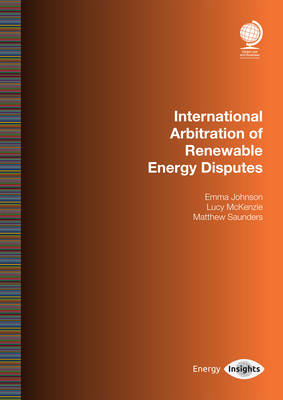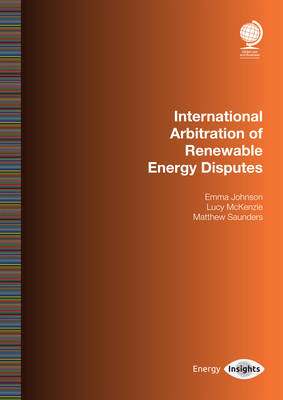
- Retrait gratuit dans votre magasin Club
- 7.000.000 titres dans notre catalogue
- Payer en toute sécurité
- Toujours un magasin près de chez vous
- Retrait gratuit dans votre magasin Club
- 7.000.0000 titres dans notre catalogue
- Payer en toute sécurité
- Toujours un magasin près de chez vous
International Arbitration of Renewable Energy Disputes
Emma Johnson
Emma Johnson, Lucy McKenzie, Matthew Saunders
Livre broché | Anglais
120,45 €
+ 240 points
Description
Despite a temporary decline in energy usage and emissions resulting from the confinement policies adopted by many states in response to the Covid-19 pandemic, the world is not on track to meet the Paris Agreement climate change goals. In order to bridge the 'emissions gap' by 2030, the energy industry is critical to achieving the necessary cuts to emissions, however, it must also balance increasing energy demand with the need to achieve sustainability of energy supply for future generations. This requires the industry to transition from dependence on fossil-fuel sources and look to new technologies that underpin a low-carbon economy. Renewables are central to this transition. The increase in renewable energy capacity globally and the complex and relatively untested nature of renewables projects and the contracts underlying them give rise to a wide range of potential disputes. International arbitration has long been the preferred dispute resolution forum for the energy sector and is well placed to be the leading process for resolving the many and varied disputes that can arise in the lifetime of a renewables project. In light of the increased prevalence of renewable disputes, this Special Report considers: -the defining characteristics of renewables projects; -the scope for disputes to arise in the implementation of these projects at an inter-state, investor-state and commercial level; -the suitability of arbitration to resolve these disputes, and how its processes can be adapted to resolve them in an efficient and effective way; and -what the future of arbitration of renewable energy disputes might look like. Written for both a legal and non-legal audience, this Special Report is relevant to those interested in learning about the scope for disputes in the renewables sector, how they can be avoided, and how arbitration can best be deployed to prevent delay and help push energy transition forward.
Spécifications
Parties prenantes
- Auteur(s) :
- Editeur:
Contenu
- Nombre de pages :
- 87
- Langue:
- Anglais
Caractéristiques
- EAN:
- 9781787424661
- Date de parution :
- 17-09-21
- Format:
- Livre broché
- Format numérique:
- Trade paperback (VS)
- Dimensions :
- 212 mm x 298 mm
- Poids :
- 281 g

Les avis
Nous publions uniquement les avis qui respectent les conditions requises. Consultez nos conditions pour les avis.






